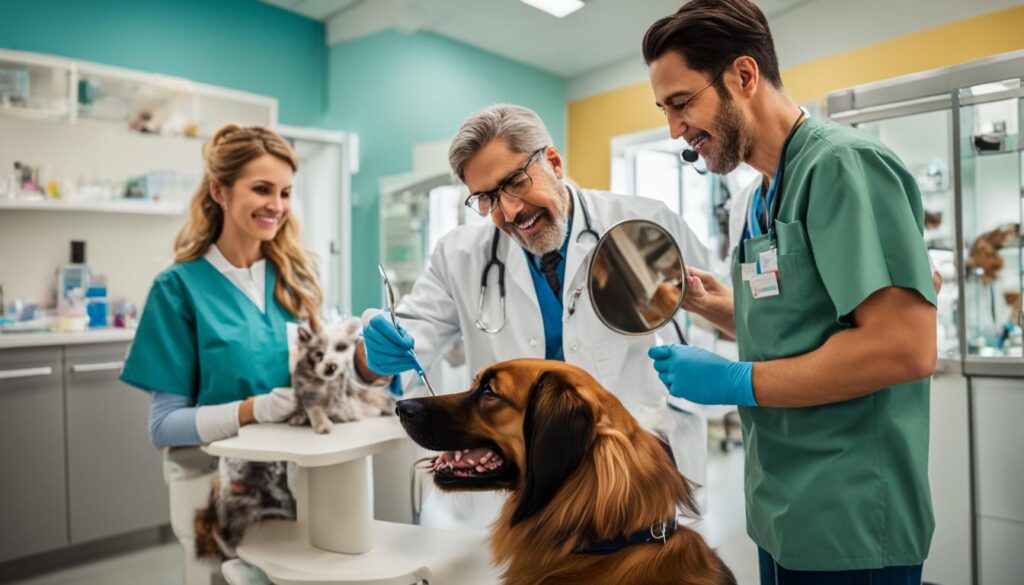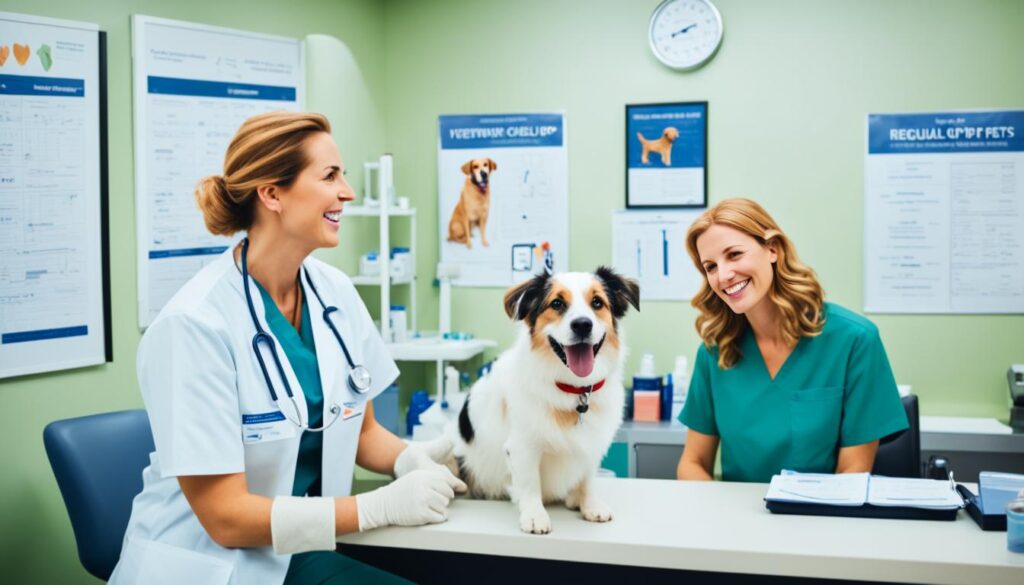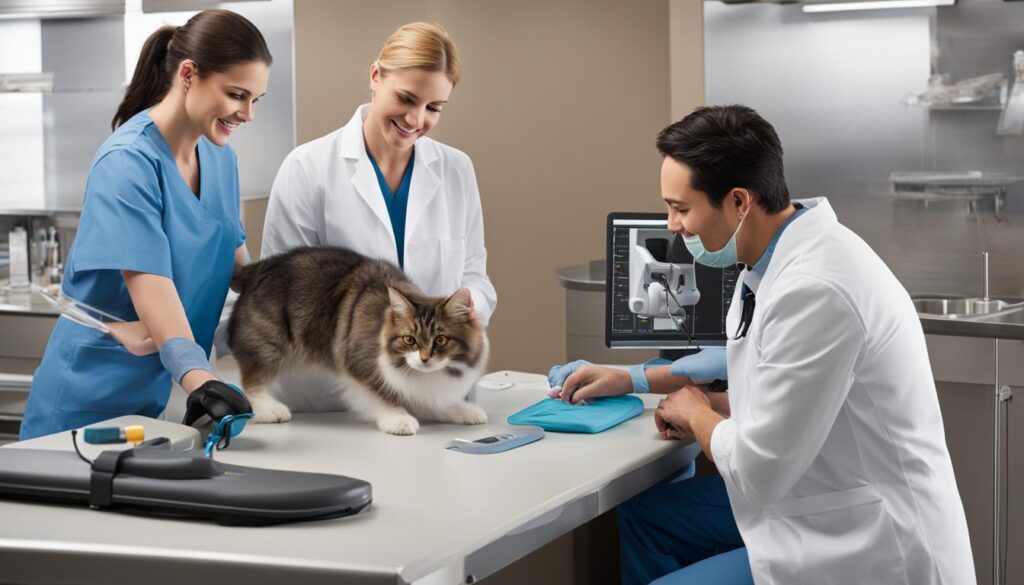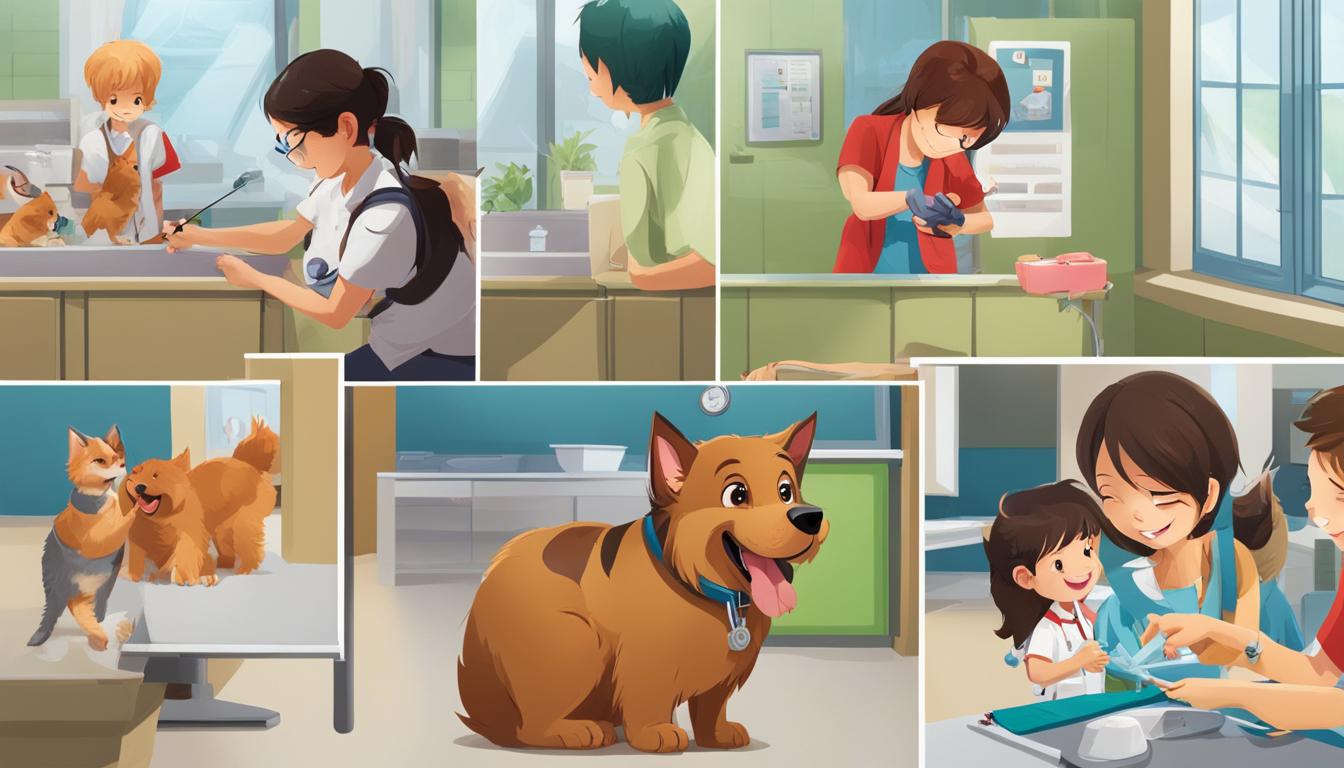Welcome to our guide on pet health and wellness tips. As a pet owner, you want to ensure the well-being of your furry friends and provide them with the best care possible. One crucial aspect of pet care is regular check-ups with a veterinarian. These routine visits play a vital role in maintaining the health and happiness of your pets. In this article, we will explore why regular check-ups are essential, the hidden signs of pet discomfort you might miss, the role of professional evaluations, the comprehensive examinations performed by vets, the importance of early disease detection, the cost-effectiveness of preventive care, useful pet health and wellness tips, creating a stress-free veterinary experience, the role of advanced diagnostic tools, and the risks of ignoring routine vet visits.
By prioritizing regular check-ups, you can partner with your vet to provide the best possible care for your pets. Whether you have dogs, cats, or other pets, keeping up with their health needs is crucial. So let’s dive in and discover how regular check-ups can help keep your pets healthy and happy!
Key Takeaways:
- Regular check-ups with a veterinarian are essential for maintaining your pet’s health and well-being.
- Hidden signs of pet discomfort can be easily missed, making regular check-ups even more crucial.
- Professional evaluations by veterinarians help detect early signs of illness and provide preventive care.
- Comprehensive examinations assess various aspects of your pet’s health, including vital organs and oral health.
- Early disease detection through regular check-ups can be lifesaving for your pet.
The Hidden Signs of Pet Discomfort You Might Miss
Our pets are experts at concealing signs of discomfort or illness. As pet owners, it is crucial to be aware of the subtle symptoms that may indicate a health problem. Changes in behavior, appetite, energy levels, and grooming habits can all serve as red flags. Unfortunately, our furry friends are masters at masking pain, making it even more challenging to identify when something is wrong.
Paying close attention to your pet’s behavior is key. Look out for any deviations from their normal patterns or routines. If you notice any concerning signs, it is essential to seek veterinary care promptly. Detecting and addressing potential health issues early on can prevent unnecessary suffering and ensure that your pets receive the necessary medical attention.
Regular check-ups with your veterinarian are valuable in monitoring your pet’s health and catching any underlying problems. By partnering with your vet, you can stay proactive in maintaining your pets’ well-being and enjoy their companionship for years to come.
Recognizing Subtle Symptoms of Illness in Pets
When it comes to the health of our pets, recognizing subtle symptoms of illness can make a significant difference in their care. These signs may vary depending on the species and individual pets, but it’s important to pay attention to any changes in their behavior, appearance, or daily routines.
- Changes in appetite or eating habits
- Decreased energy levels or lethargy
- Excessive thirst or urination
- Weight loss or gain
- Vomiting or diarrhea
- Coughing or sneezing
- Changes in breathing pattern
- Loss of fur or skin abnormalities
If you observe any of these symptoms or notice anything out of the ordinary, it’s crucial to consult with a veterinarian. Early detection and intervention can help prevent the progression of potential health issues and improve the chances of successful treatment.
Cats and Dogs: Masters of Disguise When in Pain
Cats and dogs are skilled at hiding signs of pain. It’s an instinctual behavior that stems from their ancestors, who had to conceal weakness to survive in the wild. As a result, pet owners may find it challenging to recognize when their furry companions are in discomfort.
Here are some common signs that cats and dogs may exhibit when they are experiencing pain:
- Alterations in behavior, such as aggression or withdrawal
- Changes in appetite or eating patterns
- Reluctance to move, climb stairs, or jump
- Decreased grooming or excessive grooming in one area
- Changes in vocalization
- Limping or favoring a particular limb
Keep in mind that these signs may be subtle and vary from pet to pet, so it’s essential to be familiar with your pet’s usual behavior and routines. Regular check-ups with your veterinarian can aid in identifying any potential pain or discomfort your pet may be experiencing and ensuring their overall well-being.
Knowing the hidden signs of pet discomfort and understanding the importance of early intervention can help you provide the best care for your beloved pets. By staying attentive to changes in behavior, seeking veterinary care promptly, and following your vet’s advice, you can ensure a healthier and happier life for your furry companions.
Why Professional Pet Evaluations are Essential
Professional evaluations by veterinarians are crucial for maintaining your pet’s health and well-being. Vets are trained to detect even the smallest signs of illness or discomfort that may go unnoticed by pet owners. Regular evaluations allow vets to assess your pet’s overall health, identify potential health issues, and provide preventive care to keep your furry friend in optimal condition. These evaluations are an opportunity for pet owners to ask questions, seek advice on pet care, and gain a deeper understanding of their pet’s specific needs.
“Regular evaluations allow vets to assess your pet’s overall health, identify potential health issues, and provide preventive care to keep your furry friend in optimal condition.”
Comprehensive Examinations: What Vets Are Checking For
During comprehensive examinations, veterinarians assess various aspects of your pet’s health. They conduct eye, ear, and dental assessments to identify potential issues and provide necessary treatment. Regular dental care is particularly important as it not only affects oral health but also has implications for the overall well-being of your pet. Vets also evaluate the health of your pet’s vital organs, checking for any abnormalities or signs of underlying diseases. These examinations provide valuable insights into your pet’s overall health and help vets develop appropriate treatment plans if necessary.
The Importance of Regular Eye, Ear, and Dental Assessments
As part of the comprehensive examinations, vets prioritize the evaluation of your pet’s eyes, ears, and teeth. Eye assessments involve checking for signs of infection, inflammation, cataracts, or other ocular conditions. Early detection of eye problems can prevent vision deterioration or even blindness. Similarly, ear assessments help identify ear infections, mites, or other ear-related issues that can cause discomfort and affect your pet’s overall well-being. Dental assessments are crucial for maintaining your pet’s oral health. Vets examine the condition of your pet’s teeth and gums to detect tartar buildup, gum disease, or tooth decay. Regular dental care and cleanings can prevent periodontal disease and improve your pet’s overall health.
Assessing Your Pet’s Vital Organs: A Deeper Look Into Their Health
Comprehensive examinations also involve assessing the health of your pet’s vital organs, such as the heart, lungs, liver, and kidneys. Vets listen to your pet’s heart and lungs with a stethoscope to detect any irregularities or abnormalities in their rhythm or sounds. This helps identify potential heart or respiratory disorders. Additionally, vets may perform abdominal palpation to feel for any lumps or abnormalities in the organs, checking for signs of diseases or issues affecting the liver, kidneys, or other internal organs. These evaluations provide valuable insights into your pet’s overall health, allowing vets to develop appropriate treatment plans, provide recommendations, and promote preventive care.

The Lifesaving Role of Early Disease Detection
Early disease detection plays a crucial role in ensuring the health and well-being of your beloved pets. Regular check-ups and screenings enable veterinarians to identify potential health issues before they become more serious. Through the use of blood tests, urine tests, and other diagnostic tools, vets can detect early signs of diseases such as diabetes, thyroid disorders, and heart disease. By catching these diseases early, effective treatments can be initiated, improving the prognosis and quality of life for your furry companions.
Routine check-ups and screenings are essential for providing timely interventions and ensuring the long-term health of your pets. Early disease detection can be lifesaving, allowing for prompt medical interventions and appropriate treatment plans. By partnering with your veterinarian and prioritizing regular check-ups, you can proactively safeguard your pets’ well-being and contribute to their overall longevity.
Regular check-ups not only help in detecting diseases at an early stage but also provide an opportunity for your veterinarian to assess your pet’s overall health, address any concerns you may have, and offer pet health tips to optimize their well-being. By staying proactive and vigilant about your pet’s health, you can give them the best chance at a long, happy, and healthy life.
Cost-Effective Prevention: How Regular Check-Ups Save Money
Regular check-ups are not only essential for your pet’s overall health and well-being but also have significant cost-saving benefits. By detecting and addressing health issues early on, you can prevent them from becoming more serious and costly to treat in the long run.
Reducing Long-Term Healthcare Expenses Through Early Intervention
Early intervention is key to reducing long-term healthcare expenses for your pet. When health issues are identified and treated early, they are often more manageable and less expensive to address. For example, conditions such as diabetes, hyperthyroidism, periodontal disease, and obesity can be better controlled and have better treatment outcomes when identified early on.
By investing in preventive care and scheduling regular check-ups, you give your veterinarian the opportunity to detect any potential health issues and develop a proactive treatment plan. This approach can save you money in the long run, as the cost of preventive care is typically lower than the cost of treating advanced or chronic conditions.
Avoiding Costly Emergency Treatments by Routine Vet Visits
Another way regular check-ups save you money is by helping you avoid costly emergency treatments that may arise from neglecting routine vet visits. By staying on top of your pet’s health through regular check-ups, your veterinarian can identify potential issues before they escalate into emergencies.
Emergency treatments often come with a higher price tag due to the urgency and specialized care required. By prioritizing preventive care and routine check-ups, you can avoid these unexpected expenses and ensure that your pet receives the necessary care in a timely manner.

| Regular Check-Ups | Benefits |
|---|---|
| Early disease detection | Prevents conditions from becoming more serious and costly |
| Proactive treatment | Reduces long-term healthcare expenses |
| Preventive care | Avoids costly emergency treatments |
As the old saying goes, “an ounce of prevention is worth a pound of cure.” By prioritizing routine check-ups and preventive care, you can save money on veterinary expenses while providing your pet with the best possible care.
Pet Health and Wellness Tips: Leveraging Vet Knowledge
Veterinarians are a valuable source of knowledge and expertise when it comes to pet health and wellness. By incorporating their advice and tips into your pet’s daily routine, you can optimize their overall well-being and contribute to their longevity. Here are some essential pet health and wellness tips straight from the experts:
“Proper nutrition is key to maintaining your pet’s health. Ensure they are receiving a balanced and nutritious diet that meets their specific dietary needs.”
“Regular exercise is crucial for keeping your pet fit and ensuring their physical and mental well-being. Set aside dedicated time for play, walks, or other activities that help them stay active.”
“Stress management is essential for pets as well. Create a calm and soothing environment, provide them with a safe space, and practice relaxation techniques such as gentle massage or aromatherapy.”
“Grooming plays a vital role in pet health. Regular brushing, bathing, and dental care help maintain their coat and oral hygiene, preventing potential health issues.”
These pet health and wellness tips cover various aspects of your pet’s care, and by implementing them, you can ensure that your furry friend is living their best and healthiest life.
Remember to consult with your veterinarian for personalized advice and guidance based on your pet’s specific needs and health conditions. By working closely with your vet, you can create a customized wellness plan that caters to your pet’s unique requirements and helps them thrive.
Pet Care Routine: Scheduling and Preparing for Vet Visits
Establishing a consistent pet care routine, including regular vet visits, is essential for maintaining your pet’s health. To ensure a stress-free veterinary experience for your furry friend, it’s important to schedule and prepare for these visits effectively.
Creating a Stress-Free Veterinary Experience for Your Pet
A visit to the vet can be overwhelming for some pets. Implementing a few strategies can help create a calm and positive environment:
- Familiarize your pet with the veterinary clinic: Take your pet for short visits to the clinic before the actual appointment to reduce anxiety and help them get accustomed to the sights, sounds, and smells.
- Use positive reinforcement techniques: Reward your pet with treats, praise, or play after each successful visit to the vet. This positive association can help ease their anxiety and make future visits more manageable.
- Create a calm environment: Provide a comfortable carrier or leash for your pet during travel to the clinic. Use calming sprays or pheromone diffusers to create a soothing atmosphere at home and in the waiting area.
Kickstarting a Proactive Approach to Pet Health
Regular check-ups and preventive care are key components of a proactive approach to pet health. By staying ahead of potential health issues, you can ensure your pet’s well-being:
- Schedule regular check-ups: Consult with your veterinarian to determine the appropriate frequency for wellness exams and vaccinations based on your pet’s age, breed, and overall health.
- Adhere to grooming routines: Regular grooming not only helps keep your pet looking their best but also allows for the identification of potential skin issues, parasites, or abnormalities that may require veterinary attention.
- Stay up to date with vaccinations: Vaccinations are pivotal for safeguarding your pet against communicable diseases. Follow your vet’s recommended vaccination schedule and be diligent about keeping records.

Incorporating these practices into your pet care routine will not only promote their overall health and wellness but also strengthen the bond between you and your four-legged companion.
Advanced Diagnostic Tools and Their Role in Pet Health Care
Advanced diagnostic tools play a crucial role in ensuring the health and well-being of our beloved pets. These tools aid veterinarians in assessing, diagnosing, and treating various health conditions that our furry friends may experience. From blood tests and X-rays to ultrasounds and genetic screenings, these advanced technologies provide valuable insights into the overall health of our pets.
By utilizing advanced diagnostic tools, veterinarians can gather accurate and detailed information about a pet’s condition. Blood tests can help detect signs of disease, monitor organ function, and assess overall wellness. X-rays and ultrasounds allow for a closer look at internal structures, revealing abnormalities, fractures, or other potential health issues. Genetic screenings provide valuable information about a pet’s genetic predispositions, helping veterinarians develop personalized treatment plans and preventive measures.
One example of an advanced diagnostic tool used in pet health care is the electrocardiogram (ECG). An ECG records the electrical activity of the heart, allowing veterinarians to identify irregularities and potential cardiac conditions, which can significantly impact a pet’s health and well-being. This non-invasive procedure helps diagnose heart conditions, monitor treatment progress, and guide veterinarians in developing appropriate care plans for pets with cardiac issues.
Another valuable diagnostic tool is computed tomography (CT) scan, commonly used to obtain detailed cross-sectional images of the pet’s body. CT scans provide enhanced visualization of structures and help diagnose conditions that may not be detected through X-rays alone, such as tumors, fractures, or internal bleeding. This advanced imaging technique aids veterinarians in making accurate diagnoses and delivering targeted treatments for pets in need.
Understanding the significance of these diagnostic tools allows pet owners to appreciate the comprehensive and advanced care that veterinarians provide. By incorporating advanced technologies into pet health care, veterinarians can make informed decisions about diagnosis, treatment, and overall management of various health conditions.

Conclusion
Why Ignoring Routine Vet Visits Can Be Risky Business
Partner with Your Vet for a Healthier, Happier Pet
In conclusion, regular check-ups are vital for maintaining your pet’s health and well-being. Ignoring routine vet visits can pose risks to your pet’s health, as potential health issues may go unnoticed or become more serious over time. By partnering with your vet and prioritizing preventive care, you can ensure that your pets receive the necessary attention and medical interventions to lead healthier, happier lives.
Regular check-ups are an investment in your pet’s long-term health, providing early disease detection, cost-effective prevention, and valuable pet care advice from veterinary professionals. Don’t wait until your pet is showing obvious signs of illness to visit the vet. By being proactive and scheduling regular check-ups, you are taking a crucial step in safeguarding your pet’s well-being.
Your vet is a trusted partner in your pet’s healthcare journey. They have the knowledge and expertise to identify potential health issues and provide the appropriate care. By establishing a strong relationship with your vet, you can work together to address any concerns, discuss preventive measures, and optimize your pet’s overall health.
FAQ
What are the hidden signs of pet discomfort that I might miss?
Changes in behavior, appetite, energy levels, and grooming habits can all be subtle signs that your pet is experiencing discomfort or illness. Additionally, cats and dogs are skilled at hiding pain, making it even more important to pay close attention to any changes in their behavior or routines.
Why are professional pet evaluations essential?
Professional evaluations by veterinarians are crucial for maintaining your pet’s health and well-being. Vets are trained to detect even the smallest signs of illness or discomfort that may go unnoticed by pet owners. They can provide comprehensive examinations, identify potential health issues, and offer preventive care to keep your furry friend in optimal condition.
What do vets check for during comprehensive examinations?
During comprehensive examinations, veterinarians assess various aspects of your pet’s health. They conduct eye, ear, and dental assessments to identify potential issues and provide necessary treatment. Vets also evaluate the health of your pet’s vital organs, checking for any abnormalities or signs of underlying diseases.
Why is early disease detection important for pets?
Early disease detection can be lifesaving for pets. Routine check-ups and screenings play a crucial role in identifying potential health issues before they become more serious. Through blood tests, urine tests, and other diagnostic tools, vets can detect early signs of diseases such as diabetes, thyroid disorders, and heart disease.
How do regular check-ups save money in the long run?
Regular check-ups not only contribute to your pet’s overall health but can also save you money in the long run. By detecting and treating health issues early on, you can prevent them from becoming more serious and costly to treat. Early interventions for conditions such as diabetes, periodontal disease, and obesity are more affordable and have better outcomes.
What are some useful pet health and wellness tips?
Some valuable pet health and wellness tips include providing a balanced diet, ensuring regular exercise, managing stress, and maintaining good grooming habits. For more specific tips, it’s best to consult with your veterinarian who can provide tailored advice based on your pet’s individual needs.
How can I create a stress-free veterinary experience for my pet?
To create a stress-free veterinary experience for your pet, you can familiarize them with the veterinary clinic environment, use positive reinforcement techniques, and create a calm and comforting atmosphere. It’s important to make vet visits a positive and rewarding experience to reduce any anxiety or fear your pet may have.
What is the role of advanced diagnostic tools in pet health care?
Advanced diagnostic tools, such as blood tests, X-rays, ultrasounds, and genetic screenings, play a crucial role in pet health care. These tools help veterinarians assess, diagnose, and treat various health conditions in pets, providing valuable insights into your pet’s overall health and enabling effective treatment plans.
Why should I not ignore routine vet visits for my pets?
Ignoring routine vet visits can pose risks to your pet’s health, as potential health issues may go unnoticed or become more serious over time. Regular check-ups allow for early disease detection, preventive care, and access to expert advice from veterinary professionals, ultimately contributing to your pet’s overall well-being and longevity.
Source Links
- https://www.zoetispetcare.com/blog/article/regular-veterinary-check-ups
- https://abcvetoflewisville.com/blog/early-detection-lifelong-protection-why-regular-vet-check-ups-are-essential-for-your-pet-s-health
- https://docansede.com/benefits-of-regular-check-ups-for-your-pet/

